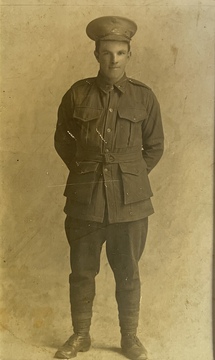
MULLIGAN, John
| Service Number: | 3198 |
|---|---|
| Enlisted: | Not yet discovered |
| Last Rank: | Private |
| Last Unit: | 58th Infantry Battalion |
| Born: | Bunyip, Victoria, Australia , 1895 |
| Home Town: | Bairnsdale, East Gippsland, Victoria |
| Schooling: | Not yet discovered |
| Occupation: | Labourer |
| Died: | Meningitis, South Africa, 15 January 1917 |
| Cemetery: |
Woltemade Cemetery (Maitland), Cape Town, South Africa Sec. 4. 97448C. |
| Memorials: | Australian War Memorial Roll of Honour |
World War 1 Service
| 16 Dec 1916: | Involvement Private, 3198, 58th Infantry Battalion, --- :embarkation_roll: roll_number: '20' embarkation_place: Melbourne embarkation_ship: HMAT Medic embarkation_ship_number: A7 public_note: '' | |
|---|---|---|
| 16 Dec 1916: | Embarked Private, 3198, 58th Infantry Battalion, HMAT Medic, Melbourne |
Help us honour John Mulligan's service by contributing information, stories, and images so that they can be preserved for future generations.
Add my storyBiography contributed by Janette Frawley
I found a photo of your grave on the internet yesterday. You are one of forty-five Australian servicemen from World War One buried in the Military Allotment at the Maitland Road Cemetery in Cape Town, South Africa. I wish that your sister Myrtle, my grandmother, had a photo of your grave at the very least. I think that it would have given her some degree of closure because Myrtle held you very close to her heart for her entire life. In fact, one of her greatest wishes was that she would be able to one day travel to Cape Town to visit your grave.
Your entire service to the Australian Imperial Force lasted a mere eighty-three days. That is eighty-three days from the minute you enlisted on October 25, 1916, until the moment you drew your last breath in Cape Town on January 15, 1917.
EIGHTY. THREE. DAYS.
Did you enlist because of peer pressure? Or did you join for a lark and to see the world? What did your parents, John and Elizabeth say when you told them that you were going to war? Did your siblings, Alf, Myrtle and Violet come to Melbourne to wave you goodbye? How did you feel when your ship, the HMAT Medic slipped from the docks on December 16, 1916, after a mere six weeks’ training? Did you feel proud to be an Australian in your uniform or was there some trepidation or even regret as your ship tackled the huge Indian Ocean on its way to Europe?
You weren’t to know that there wouldn’t be a war for you, John. You didn’t see any conflict. You didn’t fire one shot. You were dead exactly one month after departing Melbourne. An insidious germ lay dormant in your ill-prepared body and like a snake, waited for an opportunity to strike. Perhaps you were unwell before you embarked on your adventure over the seas but didn’t want to say anything. Perhaps you thought it was just nerves or seasickness. Did your friends tell you that ‘you’d be right, mate’? Your medical records stated that you were fit and healthy for overseas service once you had some dental work done. Was that work carried out under sterile conditions back in 1916? Or were the army dentists under enormous stress as they poked and prodded, filled and extracted the teeth of thousands of young men? Was this the root cause of the only battle you so bravely fought?
When you were transferred from the ship to City Hospital in Cape Town, you were dangerously ill with meningitis. You died two days later. Alone. A long way from home and without your family. What were your last thoughts, John? Were they of your parents, of your brother and sisters? Were you thinking of your sunbaked country, your friends, your neighbours? Did you cry for the wife and children you would never have? Did you yearn for your mother’s arms enfolding you and whispering words of courage in your ears? In my heart of hearts, I hope that there was someone with you as you passed away.
They lied to you, John. The Great War was not the war to end all wars, and those who did survive the horrors of Gallipoli, the trenches of the Western Front, or the deserts of the Middle East either succumbed to the outbreak of Spanish Flu or they came home physically and mentally broken. Bodies filled with shrapnel, scarred where bayonets pierced their soft flesh, limbs missing, lungs destroyed from mustard gas, minds reliving horrors they could not speak of. Perhaps you were the lucky one, although I am sure you would not have believed that at the time.
I have your Dead Man’s Penny, the hard-fought-for bronze memorial plaque awarded to your family to honour your life and service in the absence of repatriation of your remains. It’s small compensation for your life, but it, along with your official army photo has served as a personal tribute to your willingness to join a generation of young men who stepped up to fight for the Commonwealth. For as long as I can remember, it had pride of place on my grandmother’s mantlepiece until she died. It now sits on my mantlepiece, and your memory shall live on for generations to come.
Lest we forget









